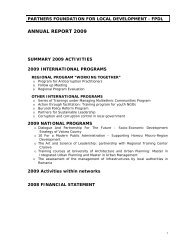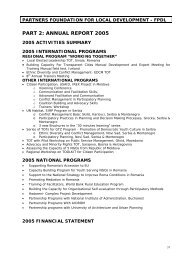Organizational Development: A Manual for Managers and ... - FPDL
Organizational Development: A Manual for Managers and ... - FPDL
Organizational Development: A Manual for Managers and ... - FPDL
You also want an ePaper? Increase the reach of your titles
YUMPU automatically turns print PDFs into web optimized ePapers that Google loves.
Supplement 2<br />
Local Government <strong>and</strong> Public Service Re<strong>for</strong>m Initiative (LGPSRI OSI)<br />
Centre <strong>for</strong> Local Government Studies, SPTC, Klaipeda, LITHUANIA<br />
Methodological recommendations on training<br />
Design <strong>and</strong> delivery <strong>for</strong> local governments in CEE <strong>and</strong> CIS<br />
These recommendations are elaborated with the view to contribute in the process of training<br />
practice development at the institutions active in providing in-service training <strong>for</strong> local officials in<br />
East European countries. They are based on the findings of “In-service Training Research Project<br />
in Lithuania”, which was supported in 1997 by Local Government <strong>and</strong> Public Service Re<strong>for</strong>m<br />
Initiative of the Open Society Institute.<br />
Recommendations do not cover all aspects of training <strong>and</strong> do not pretend to be the final truth; they<br />
just reflect authors opinion based on the research made in 1996-97 <strong>and</strong> their personal experience<br />
as trainers at the School of Democracy <strong>and</strong> Administration in Nida. The School was active since<br />
1991 in providing in-service training <strong>for</strong> local officials <strong>and</strong> training of trainers <strong>for</strong> representatives of<br />
several countries of post-SU region.<br />
The review of literature on the topic was not undertaken within the project. Authors do not intend to<br />
fall into discussion with other existing approaches. It is not an academic paper, but a piece of some<br />
practical advises <strong>for</strong> the consideration of those who may be interested. It is left to the reader to<br />
make comparisons with other points of view; his own practice in the field, <strong>and</strong> make corresponding<br />
conclusions.<br />
Authors believe that successful training is always based on the consciousness, flexibility, <strong>and</strong><br />
creativity of trainers <strong>and</strong> organizers of training events. Blind following of any hard framework of<br />
training programs or organizational patterns elaborated by others, even if it works sometimes <strong>and</strong><br />
somewhere, may cause failures when target groups or technical conditions differ from the original<br />
design assumptions. This way is also a blind alley in terms of developing trainers themselves.<br />
There<strong>for</strong>e, this paper is just an invitation to the dialog with partners.<br />
Recommendations are focused on the training impact on organizational changes <strong>and</strong> building<br />
capacity of local governments in solving their problems when providing services to the community.<br />
Basic criteria <strong>for</strong> evaluation of the success of training lay in the changes, which will happen in<br />
working environment of those who have been trained. If there are no changes, the training tends to<br />
be useless - does not matter, how happy participants were at the end of the course. In fact, this<br />
193
















